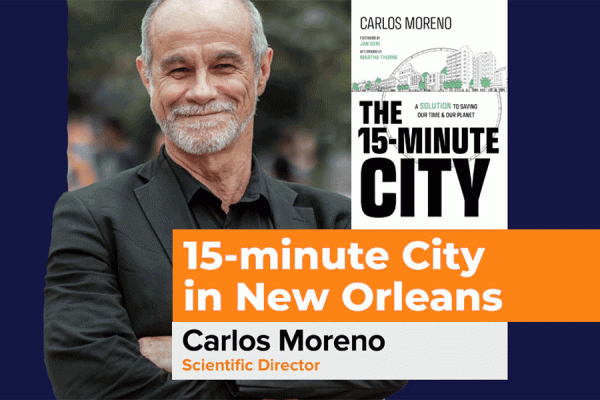French urbanist and professor Carlos Moreno, who popularized the planning concept of the “15-minute City,” will be the guest lecturer at a University of New Orleans seminar in May. Moreno will discuss that planning concept at UNO’s “Understanding Proximity: 15-minute City in New Orleans” Office of the Provost Academic Forum scheduled for May 10 in the University Center.
The “15-minute City” defines an urban vision in which residents can access their daily needs and essential services within a 15-minute trip by foot or bike. The term, coined in 2016 by Moreno and popularized by Paris Mayor Anne Hidalgo, has become shorthand for “walkable, mixed-use neighborhoods that provide easy access to transit and amenities.”
Moreno, of Chaire ETI, IAE Paris Sorbonne, University Paris 1 Panthéon Sorbonne, will discuss the 15-minute City concept, focusing on sustainable cities and climate action. He will also discuss his new book, “The 15-Minute City: A Solution for Saving Our Time and Our Planet,” which looks at how this idea can improve urban living by making essentials quickly reachable by foot or bike.
In addition, Catherine Gall, of Chaire ETI, IAE Paris Sorbonne, University Paris 1 Panthéon Sorbonne, will highlight how the 15-minute City model works worldwide. She will use her experience to outline the triumphs and hurdles in applying the concept to various cities and share tips for North American urban centers like New Orleans.
UNO planning and urban studies professor Michelle Thompson will share findings from her collaborative neighborhood proximity analysis of the Hoffman Triangle, an evolving, revitalized New Orleans neighborhood that has been discussed as a potential model for a 15-minute City neighborhood. Thompson partnered with the Associated Neighborhood Development (AND) to evaluate quality-of-life indicators within Hoffman Triangle, which is located in Central City.
Thompson’s discussion will describe findings from the Hoffman Triangle 2024 Public Participation Geographic Information Systems (PPGIS) project compared with neighborhood profiles conducted in 2011 and 2012.
The Hoffman Triangle PPGIS project is an example of how the community, the City of New Orleans and the University can work together to monitor, evaluate and influence neighborhood change “from the ground up,” Thompson said.
The goal of planning and conducting the neighborhood profile is to be able to take the “15-minute City” global model, but apply it locally, Thompson said.
“What does 15-minutes really look like in a community or neighborhood or city where you don’t have equal access to equipment—health, parks, schools, et cetera?” Thompson said. “It’s very different. Maybe we’re really a 20-minute city, so that’s why I changed it to a “proximity” analysis.”
The forum is sponsored in partnership with the Louisiana chapter of the American Planning Association, Who Data.org, Crescent City Shapers, the University of Paris, the University of New Orleans’ Student Government Association and University Ambassadors.
The forum, which begins at 5 p.m., is free but registration is required. For more information or to register, visit “Understanding Proximity: 15-minute city in New Orleans.”





